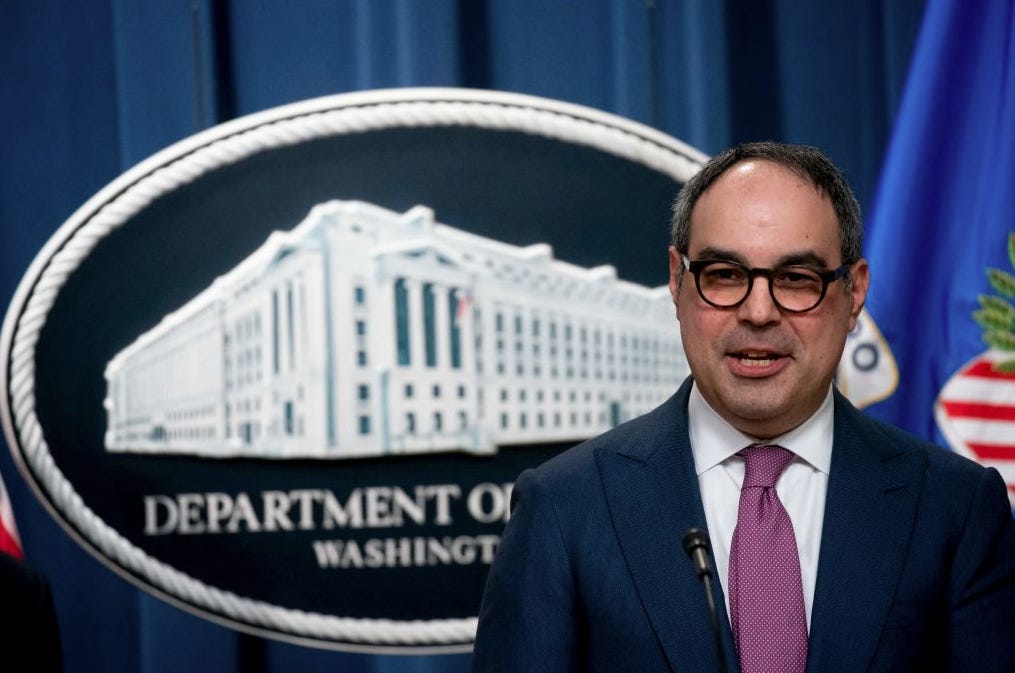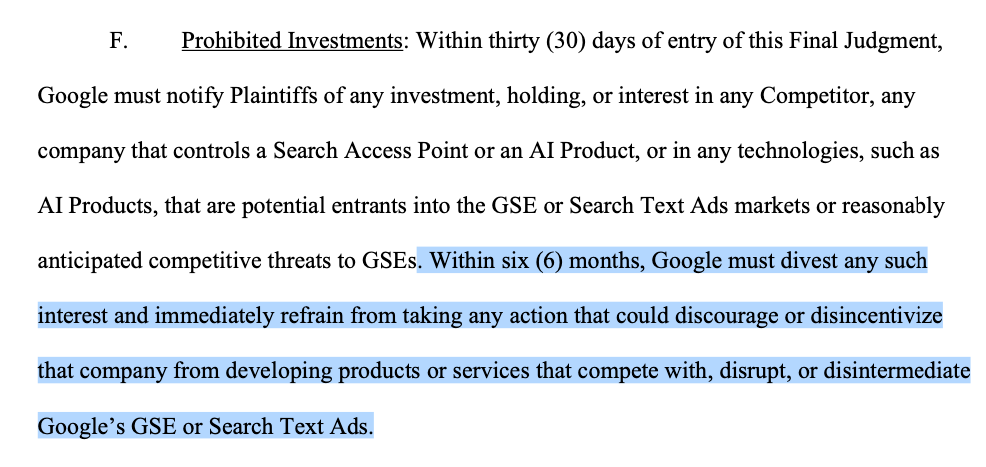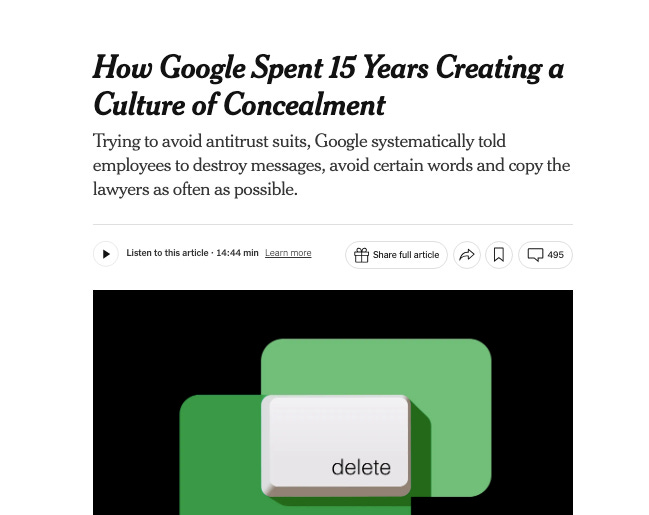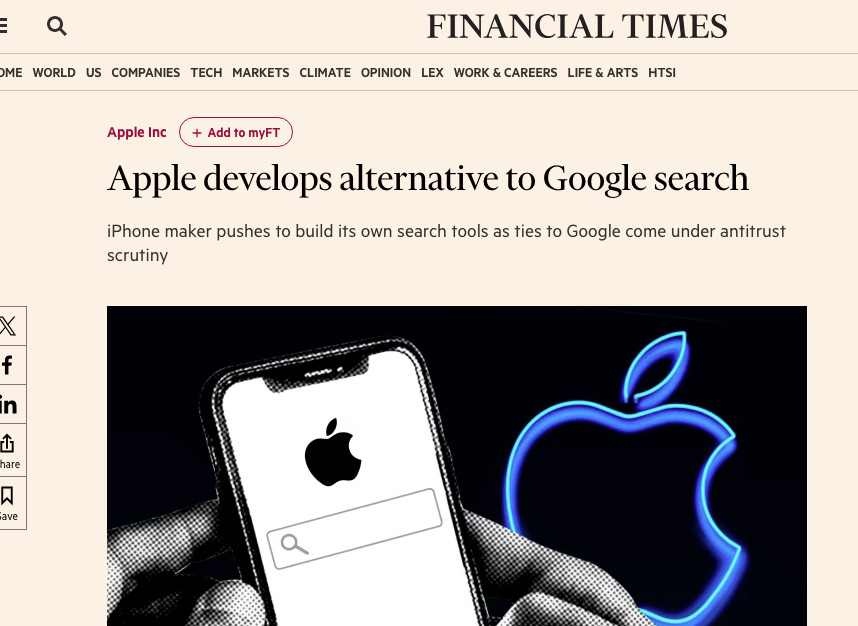The Proposal to Break Up Google Is Finally HereThe Antitrust Division proposed a comprehensive solution to Google's monopoly, including pushing Apple into search. Now comes a mini-trial where Judge Amit Mehta will decide what to do.Three and a half months ago, D.C. district Judge Amit Mehta found that Google broke antitrust law in monopolizing search and search advertising. In a tightly reasoned 277-page opinion, Mehta’s conclusion was that Google, by controlling the means of distribution of search engines through its ownership of Android and Chrome, as well as contracts with Apple, Samsung, Verizon, and other distributors, prevented rivals from getting access to search markets. Monopolization trials have two parts, a finding of whether the company broke the law, and then a fight over what to do to remedy the market. After Mehta’s August finding that Google broke the law, we entered the second phase. Mehta asked the government to propose a remedy, and then set up a mini-trial from April 22 to May 2, with the goal of having the case resolved by August at the latest, after which it’ll go to appeal. On Wednesday, the Department of Justice Antitrust Division published its proposal for Google’s unlawful behavior, which includes a provision to force a sale of the Chrome browser, and potentially the Android mobile operating system that powers hundreds of millions of phones. While most of the reporting is focused on the ‘break-up’ aspect, there’s much more to it than that. In this piece, I’m going to explain the proposal, the legal environment, and the politics of a Google break-up in the Trump era. Let’s start with the solution itself. The goal of the Antitrust Division is twofold. Enforcers want to “pry open” the search market, and the second is to make sure that Google can’t leverage its existing monopoly in search to control future markets, most notably artificial intelligence-based search models. There’s a lot of pushback on this remedy, but the government is merely adopting the long-standing legal principle that lawbreakers don’t get to enjoy the fruits of their unlawful conduct. That Google’s ill-gotten gains are absolutely enormous suggests that the remedy must be aggressive. (Indeed my critique of this proposal is that it’s not far-reaching enough.) (1) Allow New Entrants into the Market (Like Apple Search)The heart of the monopolization issue at trial was that Google controlled the means of distribution for search, the shelf space if you will, and denied that to rivals. So the first request is to end that control at various distribution points. The first of those chokepoints is Chrome, the Google-owned browser with a 67% market share that puts Google as default. The remedy mandates a sale of Chrome, a “break-up” of the company. The second chokepoint is Android, the Google-owned mobile operating system inside hundreds of millions of phones. For that, Google can either sell Android, or it can submit to regulation to ensure that it doesn’t privilege its own products or degrade its rivals on its mobile operating system. If Google accepts the regulatory solution but “monopolized markets have not experienced a substantial increase in competition,” then Android gets sold off. The third chokepoint are the various “search access points” run by third parties, like independent browsers, phones made by third parties, and Apple. Google pays these entities to default its search engine, and not feature the search engine of its rivals. Google must end most of these payments, meaning ending Google’s $20 billion + checks to Apple annually, which will take a big dent out of Apple’s profits. Without getting paid to have Google as the default search engine for the iPhone, what will Apple do? The DOJ thinks it will enter the search market, which it put in the remedy. Aside from ending these distribution chokepoints, Google would no longer be allowed to mandate its search engine as a default in return for special treatment by the Play store or any other part of Google. Breaking apart control of distribution has the clearest through-line to the bad behavior by Google, and I think it’ll be hard to rebut the thrust of it, though the specifics might be altered. Judge Mehta, for instance, may or may not have trouble with a break-up, but he will want to break the distribution bottlenecks. (2) Get Rid of Google’s Head Start in SearchBut ending the bad behavior isn’t enough, because Google has a massive head start on any rival. It has more data, a powerful web index, and a wonderful brand. Since search is a scale product, and its rivals have no scale, their quality is also worse. So the second part of the remedy is to force Google to share its ill-gotten competitive advantages with other players in the market who had been thwarted by its bad behavior. There are a number of mechanisms to foster a level playing field for rivals. Google has a big search index and lots of data in its own properties, as well as user-side data, it uses to build its products. It must give equal access to these resources that it uses for its own search product to “Qualified Competitors” at marginal cost and on a non-discriminatory basis, consistent with security and privacy safeguards. The way to prevent privacy as a pretext for unfair behavior is simple and ingenious; if Google can’t share data with rivals while guaranteeing the protection of user privacy, then it can’t itself use that data in its products. Google must also allow rivals to syndicate its search feed and search ad feed for ten years, at marginal cost, with no restrictions on how they are displayed. It has to share results data with those rivals, which will allow them to build search engines of high quality. Finally, it has to give a choice screen of different search engines to all new users of any Google browser so they can select among rivals. And this choice screen will be accompanied by “a nationwide advertising and education campaign” to users, and even payments to users to try non-Google options (which the Colorado AG, not the DOJ, asked for.) (3) Give Back Power to Publishers and AdvertisersTwo of the victim groups in Google’s monopolization scheme were advertisers and publishers, who both got locked into the search giant’s ecosystem. For advertisers, the remedy proposal forces Google to share data and pricing and give them additional power on how their ads are displayed, and for publishers, the remedy proposal allows them to remain searchable in Google while opting out of being used in AI training models or other Google AI products. The idea is to let advertisers and publishers switch to rival ad platforms and change to being found in rival search engines without encumbrance. (4) Ensure Artificial Intelligence Is CompetitiveFinally, the Antitrust Division is seeking to ensure that Google can’t leverage its power in search to control the next great computing platform, which is AI-enabled search. Right now, there is potential competition, but Google has many levers to self-preference its own version of AI and kill potential rivals. There are precedents for how antitrust operates in moments of new technology deployments. During the transition from desktop to mobile in the late 2000s, Google managed to leverage its search monopoly in personal computers to an even stronger search monopoly on mobile phones. There was a moment to thwart this leveraging strategy with an antitrust suit, but the government pulled back in 2012. The first episode of our Organized Money podcast is about why that happened. There are also good precedents. Antitrust cases prevented IBM’s control over mainframes to turn into control over mini-computers or personal computers. Similarly, the case against Microsoft allowed then-small companies like Google and Amazon to escape the control by the then-operating system monopolist. The DOJ wants to facilitate an open computing order in AI. Getting rid of the distribution control over search is a key part of allowing new entrants, like OpenAI, into the market. But more than that, in this remedy, Google would be forced to sell off AI-related investments that might compete with its search engine, most notably its stake in Anthropic. It would also be prohibited from future investments in potential rivals. Google would have to compete in AI on an even playing field, not through acquisitions or foreclosing data or distribution to rivals. EnforcementOk, so how does all of this get enforced? It’ll ultimately be in the judge’s hands, but as with the Microsoft case, the operational work will be handled by a five person “Technical Committee” and a complaint process, paid for by Google. One of the members will be picked by the government, one by the states, one by Google, and the other two will be picked by those three committee members. Presumably they can hire staff; in the early 2000s, Microsoft’s technical committee had 90+ people employed, and they wrote code to force the company to comply with its interoperability mandates. There are a few parts of the remedy I don’t love. The first is that members of this technical committee are highly constrained in sharing data; they aren’t even allowed to speak publicly about any of the work. That’s weird and a doubling down of the excessive secrecy happening in this part of the world. The second is that there’s only a mild anti-retaliation provision in the proposed order, which isn’t enough to deter anyone. The truth is that the judge should probably mandate that Google’s general counsel Kent Walker, who sanctioned this illegal behavior, should be fired. Ultimately, Google will not comply with any decree, unless the leadership of the company feels there will be personal consequences if they do not. What Now?Google, unsurprisingly, reacted angrily, as the firm and its executives simply do not accept that they lost the trial. Walker penned a blog post noting “we’re still at the early stages of a long process,” while calling the DOJ proposal a “radical interventionist agenda” that would break Google products and destroy American investment in AI. One of the more interesting points he made was that Google finances Firefox browsers, and that this settlement would break that financial model. Firefox is at this point a minuscule portion of the market, and has essentially been corrupted so it’s a lobbying arm of Google. But a few others made the same point. Jean-Paul Schmetz, chief of ads for search engine provider Brave, said that if browsers “send traffic to Google, then you should be compensated in a nondiscriminatory manner." Such dependency on Google is part of why the company has been so difficult to dislodge. Wall Street was extremely angry at the proposal, in particular the requirement to syndicate its search index to rivals.
That said, those who would like to compete were pleased. Kamyl Bazbaz, of DuckDuckGo (DDG), for instance, said the proposal would "unleash a new era of innovation, investment, and competition." One question is who would buy Chrome (or Android.) Would it make sense to have a different corporation, like Amazon or Microsoft, be able to vertically integrate its search engine into a browser? What about OpenAI? Could Chrome become an independent company? The worth of that browser alone is something like $15-20 billion, and will require some hard thinking about what a business model for underlying internet infrastructure really should be. All that said, while I’m optimistic, I have three concerns. The first is that Judge Mehta is cautious, and may thwart the monopolization claim by badly handling the remedy phase. He could decide to delay the enactment of any remedy until the case is fully exhausted on appeal, which could mean nothing happens until 2027 or 2028, and by then new AI-enabled markets will be solidified. He could also see this remedy proposal as far-reaching, instead of what it really is, which is a mild attempt to roll back an enormous fifteen year trillion dollar plus monopoly. Legally, there’s a lot of good precedent for the DOJ’s remedy, though you can also find cases that encourage judicial caution. Additionally, Judge Leonie Brinkema decision in the adtech case is coming soon, and Judge James Donato’s decision on Google’s app store is out. So there is an interplay there likely to make the adopted remedy more aggressive than what Mehta might naturally be inclined to accept. In terms of the law, the most recent analogous case on monopolization remedies was Microsoft in the early 2000s, where the circuit court reversed the order of Judge Thomas Penfield Jackson to break-up the company and stripped him of jurisdiction. The judge bashed Microsoft to reporters, refused to hold an extended set of hearings on the potential remedy, and that was one reason for the reversal. But the circuit court centered its discussion on how it disagreed with the district court on two of the underlying antitrust claims, asserting that Microsoft, while a monopolist in operating systems, hadn’t acted illegally when it came to browsers. Basically, the higher court judges said that what Microsoft did, while illegal, wasn’t that bad, so the remedy didn’t make sense. Judge Mehta is much more cautious, thorough, and buttoned down than Penfield Jackson, so he likely won’t be reversed in his liability finding. But I do think he’ll be likely to try and split the baby in ways that could be unproductive. The second concern is that the existing leadership of Google is implacably opposed to making this order work, and they will sabotage it at every opportunity. One reason that the AT&T break-up went well is because, after a decade of litigation, the executives ultimately agreed to do it. Similarly, the Microsoft antitrust litigation led to an executive turnover, and the new regime was far more willing to allow competition. Google, however, is completely unrepentant. I just don’t think that a company run by an unchastened Sundar Pichai as CEO and an unethical Kent Walker as general counsel, with creepy monopolist Larry Page in the background in some sort of secret position of control, will help foster a good outcome. I’m not just offering idle speculation or personal disdain. Indeed, workers at Google are demanding help from the DOJ because they are threatened if they mention antitrust. And the New York Times on Wednesday published a piece on the culture of corrupt secrecy fostered by Walker, where the firm seems to deliberately and unlawfully hide evidence from investigators. Even Judge Mehta was annoyed.
I’m disappointed that the DOJ didn’t ask for Google general counsel Kent Walker to be fired. It’s extremely hard to change a corporation when its leaders deeply oppose ending their methods of running that corporation. My third concern is Donald Trump’s incoming administration. I don’t know how he’ll approach antitrust or Google, but his antitrust chief, whoever it is, can continue the case aggressively, or try to settle it for a weak remedy, as the George W. Bush administration settled the Microsoft case brought by Bill Clinton. Trump brought Elon Musk on a call with Google’s CEO, who has been complimenting the President incessantly. And Trump’s new attorney general pick, Pam Bondi, worked as a lobbyist at a firm whose clients were Google, Amazon, and TikTok. That said, there are states involved as plaintiffs, so those state enforcers can continue as plaintiffs even if the Federal government settles. Judge Mehta probably won’t be happy with a bad settlement, and has authority to thwart that. And since Trump brought the case in the first place, it would be weird if he weakened it now. I’m not saying Trump will go in a particular direction, only that what he does is a wild card. Ultimately, investment decisions have to be made now about the future. And that brings me to the most important part of this remedy proposal. The Linchpin of the Big Tech CartelIn 2020, I discussed this important story from the Financial Times on internal Apple attempts to build a search engine, and asked ‘Could Google Soon Face… Competition?’ There are many reasons the Google case matters, and having more search engines in the market will make us a better society. But one core problem in terms of power dynamics is that the Apple-Google deal, where Google pays Apple $20 billion a year not to compete, effectively makes these two multi-trillion firms part of a cartel. If that alliance ends, then a lot of possibilities open. Apple will go after Google’s margins, and Google will have to compete aggressively in Apple’s territory in turn. The other big tech firms will also likely enter the search market, as will a host of smaller companies using AI. You’ll see new and different ways to look for information, different models for phones and data stored in smart homes, and innovation in browsers. More broadly, we won’t know what kind of innovation we’ll see until we see it. In the late 1960s, IBM faced the start of a fourteen year long antitrust suit. At the time, IBM had immense power up and down the computing supply chain, dominating operating systems, printing, semiconductors, and mainframes. Directly or indirectly, the legal assault on its power liberated a host of industries, leading to the creation of commercial software, networking, and personal computing, among others. If enforcers, policymakers, and judges get this one right, that’s where we’re headed. And this remedy, though it needs to be strengthened, is a step forward. Thanks for reading. Send me tips on weird monopolies, stories I’ve missed, or comments by clicking on the title of this newsletter. And if you liked this issue of BIG, you can sign up here for more issues of BIG, a newsletter on how to restore fair commerce, innovation and democracy. If you really liked it, read my book, Goliath: The 100-Year War Between Monopoly Power and Democracy. cheers, Matt Stoller This is a free post of BIG by Matt Stoller. If you liked it, please sign up to support this newsletter so I can do in-depth writing that holds power to account. |





